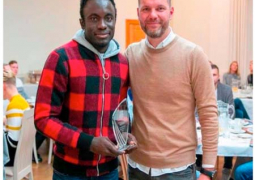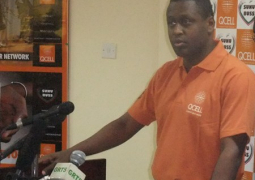Research
has shown that we Gambians are not paying the attention, deserved in the
management of these Three Factors and as a result we are held hostage and are
paying high price.
At
the moment, the visible high price we are paying is the high cost of a kilo of
meat/mutton. The complaint is that meat which had in the past been part of the
Gambian diet, have now ceased being so.
The
reason for this is that we can no longer afford the cost of meat, as its price
and that of mutton are too high and are out of the reach of the majority of the
Gambian people.
The evidence is at the moment meat is sold at
D200 per Kilo and mutton D225 per kilo. To add injury to our problem, only a few
days ago, the price of meat and mutton have been increased, each by D25. A kilo
of meat is now D225, and a kilo of mutton D250 each.
It
is now becoming a common practice, anytime the Gambian public more so when the
festivity of Tobaski is round the corner, and there is a huge cry about high
cost of cow/sheep and their products that are the time animal dealers and
livestock association seem to be riding roughshod on the feelings of the
public. They, for some reason known to them alone, prefer to ignore the
complaint of the people.
This
is a challenge and a very serious one to the sovereignty of the people and the
past government. And nothing visible has been done to convince us they have the
capability to tackle this heinous problem. All we are told in defense of this
is that we Gambians have to pay high price for meat and mutton for the Cows and
Sheep from which they are obtained are smuggled out of Senegal, Mali and
Mauritania.
Other reason advanced is what they call high
cost of transportation, high cost of feeding the animals on the way to The
Gambia and the instability of the rate of exchange of the Gambian Dalasi.
If these arguments are correct why do we
butchers and animal dealers go outside this country to buy animals they can get
from local sources? We are surprised when we are told the population of the cows in The Gambia is around 300,000 or more. Why can’t we resort to our own cows to feed ourselves? Why are we not feeding on our own animals? Is there
anything wrong with them? No, nothing is wrong with them it is we the public,
the butchers, the animal dealers, the livestock association and the government
planners who have failed to plan for the animals of The Gambia.
What
purpose are the cattle of The Gambia serving the people?
We
the people of this country give cattle population space for living, tracks for
daily rounds for grazing and water to drink, prevention and curing medicines
and we free them from paying head tax as far as it is known. And what is known
we are keeping all this animals in good health for cattle re-sellers who come
and steal them anytime they like, indicating that even the animal owners
themselves don’t even benefit much. And then who is benefiting from this
300,000 cattle heads? Certainly not the Gambian people.
What
is visible and noted to our dismay there is no visible plan from livestock
department, government planners, the livestock association and above all there
is an Animal Research Center in this country and yet we are not fertilizing and
breeding cows at a rate that will make them produce what can tip the scale in
favor of the promotion and the sale in commercial quantity of local cows in our
market and not outside and save us the trouble of depending cows from outside The Gambia. All we hear is RESEARCH! RESEARCH! RESEARCH! Till doomsday.
I
am recoding a few items I feel are the pillars that can sustain the initiation,
the breeding, the nurturing, the promotion, the sustenance and the progress of
the economy of this country
1. The
livestock department and whosoever can be of help should produce more local
cows for local consumption.
2. There
should be a learning center all over the country for people literate or
illiterate to undergo a short make-shift low level course in animal husbandry.
Young people male as well as female most be induced and must be attractive to
be into the job of animal breeding.
3.
Cow owners must be awarded good prices to make them sell their animals. They
must be shown alternative ways where they can invest their money for future
security. The big cattle kraal being presently managed by the {Jarika} cattle
owners should be broken into small groups and each put under the management of
a trained animal attendant.
It
is noted the majority of people in this country are either in business that are
not viable but the tied themselves to the business and not able to look
elsewhere for an alternative source of living or seeking office job even if
that is of a messenger preferable, however low the income.
All
this is a waste and under-utilization of man power and not contributing much to
the economic. They are only consumers.
The
young people trained as animal attendants must each be given about a dozen
animal heads and a piece of land enclosed with barbwire or any other thing, and
water and fodder be provided and the attendant properly induced.
We
the Gambian people must be re-oriented and made to rely on our brains and our
hands and not talk! talk! talk! All the time.
Browsing
through our daily newspapers, what we often read is the daily announcements of
the new associations.
These
associations may be part of the several groups of civil society, such as the
formation of human rights association, association for empowering youths, women
and children and all other highfalutin names and titles and no announcement
about the formation of any association of any group by young people for the
plowing of land, breeding cattle, catching fish.
These
are the main areas where God has put wealth for our survival and progress. So
we Gambians must speak the truth to one another and change our attitude and use
our hands and our brains for the advancement of this country.
Author: Alhagi Ba Tarawale
Tel: No 7278341,
Researcher/Journalist
Literacy house, Latrikunda Yiringanyaa
Read Other Articles In Article (Archive)
Thief earns two-year jail term
Jul 27, 2011, 1:48 PM



